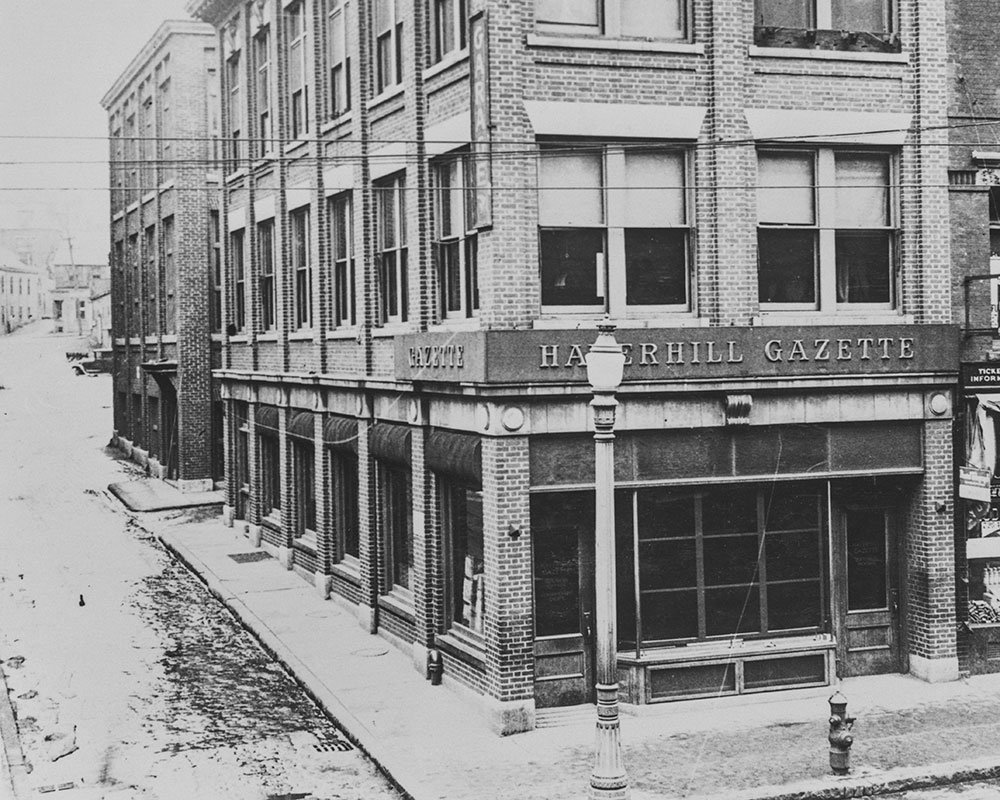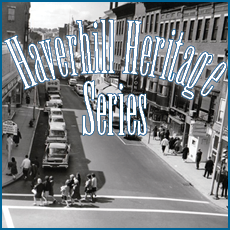Editor’s Note: WHAV couldn’t let the year end without acknowledging the Haverhill Gazette’s milestone 200th birthday that took place this year. WHAV and The Gazette have a shared heritage in John Taylor “Jack” Russ. Russ, as publisher of the Haverhill Gazette, is the man most responsible for bringing Haverhill its first radio station, WHAV, in 1947.
The Haverhill Gazette turned 200 years old in 2021 without any fanfare, but it deserves this birthday surprise, especially since it is one of the nation’s oldest, surviving newspapers.
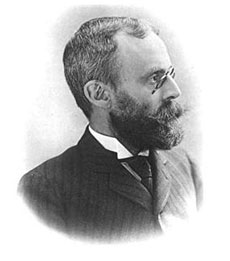
General Charles H. Taylor, the first publisher of the Boston Globe.
It is better off than the thousands of newspapers that have succumbed in recent years, but still a shadow of its former self—the victim, first of consolidation that reduced it from a robust daily to a weekly, and then of the loss of its advertising base to electronic media. John T. Russ seemed to have an early sense the printing press would someday give way to the ether. He came from an important newspaper family that gave The Gazette stability for almost half of its existence. Yet, in placing WHAV on the air in 1947, his words proved prophetic.
“We in the newspaper business have followed radio closely. We have had to, because we know that broadcasting is closely linked with the job that a newspaper has to do—the dissemination of news and advertising and public service to the community and its business life. As time goes on, the vital part that radio plays in a progressive community will become more apparent,” Russ told the WHAV audience March 16, 1947.
“Jack” Russ’ enthusiasm for radio is all the more astonishing given that his middle name was Taylor, honoring his heritage as the grandnephew of General Charles H. Taylor, the first publisher of the Boston Globe.
The Haverhill Gazette was founded in 1821 as a Saturday weekly by Nathan Burrill and Caleb Hersey. Burrill was a bookbinder by trade and Hersey served as editor. The paper, according to early Haverhill historian George W. Chase, was politically affiliated with the Federalist party and came in response to the publication of the Democratic Essex Patriot in 1818.
On Feb. 1, 1823, the Haverhill Gazette absorbed rival Essex Patriot and for a time was known as “The Haverhill Gazette and Essex Patriot.” Hersey retired, leaving Burrill as sole owner until its sale the following year, beginning a succession of owners and names for the next 60 years.
Notably, one of those owners, Abijah W. Thayer, hired poet John Greenleaf Whittier in 1830 to edit the paper, then briefly called the “Essex Patriot.” Whitter stayed only six months, leaving for a new job in Hartford, Conn., as editor of the “New England Weekly Review.” Whittier, however, would return May 4, 1836 for new owner Erastus Brooks, but left on his 29th birthday, Dec. 17, 1836 within two months of Dr. Jerimiah Spofford buying the paper. The Haverhill Gazette name was restored less than a month later.
Before the turn of the century the paper churned through a number of owners, including John H. Harris, William E.P. Rodgers, attorney Edward G. Frothingham, Alfred Kittredge, F.J. Stevens, Bridgman and Gay and Howard and Hill.
Stability arrived when John B. Wright bought it in 1899. Wright, who had already worked about 10 years as the paper’s editor, was married to the former Adelaide Taylor, sister of the inaugural Boston Globe publisher. Wright was, himself, a seasoned newspaper reporter. He began his career at the Charlestown Advertiser and went on to work for Boston News, Woonsocket Patriot and Boston Herald. He was described in the 1900 edition of “The Journal of the American-Irish Historical Society” as “one of the most expert reporters of current events ever known in the state.” He also served in 1893 as personal secretary to Massachusetts Gov. Benjamin F. Butler.
At only 46 years old, Wright died Oct. 17, 1900, leaving the Haverhill Gazette to his 20-year-old son, Robert L. Wright. The younger Wright died childless in 1939 and the newspaper passed to his nephew Russ.
Russ’ Reign Opens with Newspaper Radio Combo Threat
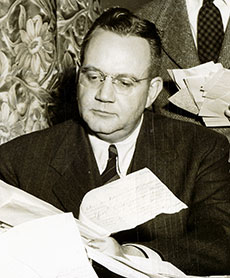
John T. Russ in his office at WHAV.
Russ’ first job after graduating from Yale was as an accountant with the Merrimack Wood Heel Company on Hale Street in Haverhill. His arrival in 1926 coincided with great turmoil within the company.
His uncle, H.W. Russ, had developed a number of patents for machinery improvements that caught the eye of United Shoe Machinery Corporation. In 1928, United Shoe purchased the company to acquire Russ’ patents, elevated Jack to plant manager and offered H.W. Russ a vice president position overseeing the various wooden heel subsidiaries. The younger Russ stayed with Merrimack Heel, which moved operations to Salem, N.H., and, after overseeing the consolidation of the plant into a branch of the United Shoe-owned FW Mears Wood Heel Company, became an executive of the FW Mears Wood Heel Company.
Years later, Gazette Editor William R. Heath described Russ’ natural newspaper talent.
“John Taylor Russ had reached full maturity when he entered newspaper work, representing the third generation of the family that acquired The Gazette in 1889. But he belonged to a newspaper family and immediately displayed an instinctive mastery of an intricate operation. This mastery was most conspicuously shown in his clear comprehension of the function of the newspaper in the community, to present the news objectively, to take forthright positions on public issues, to support movements for the good of the community.”
Taking over at the Haverhill Gazette, Russ was immediately faced with competition by the rival owner of Lawrence Daily Eagle and Evening Tribune (later consolidated into the Lawrence Eagle-Tribune), which launched WLAW radio, AM 680, at the end of 1937 (Today’s WRKO in Boston).
A truce between the papers generally held during World War II, but near the end of the war, Haverhill Mayor Albert W. Glynn brought startling news to Russ.
“Some little time ago a representative of WLA W was in my office. Among other things, he mentioned that sometime in the future his station might open a studio in Haverhill. There was nothing confidential in this discussion, nor was I asked to keep it quiet. While I am on the most friendly terms with WLAW, I, nevertheless feel that my first love and first loyalty are to my friends here in my home city. If there is to be a radio studio in Haverhill, I would much prefer to see it attached to Haverhill broadcasting facilities, owned by Haverhill people. Which is why I pass this information to you,” Glynn wrote in a letter.
Russ, of course, did eventually launch WHAV. In fact, today’s 97.9 WHAV is located in the very same transmitter building that Russ commissioned atop Silver Hill.
Russ died in 1954 at age 50. The newspaper and radio station separated and management of the Haverhill Gazette fell to a fourth generation of the family. Russ’ widow, Muriel, still held the company’s stock, but nephew J. Wesley Russ became publisher.
Beginning of the End as Locally Owned Institution
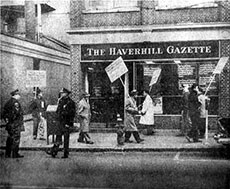
Members of Local 38 International Typographical Union picket outside the Haverhill Gazette on Merrimack Street in downtown Haverhill in 1957.
The Wright-Russ newspaper dynasty became imperiled Nov. 20, 1957 when 31 composing room workers, members of Local 38 International Typographical Union went on strike at the Gazette.
Local bitterness in the labor union-minded city encouraged Manchester Union Leader Publisher William Loeb to publish a weekly “shopper” Dec. 5 and 12, 1957, followed Dec. 16 by the full-blown local newspaper, Haverhill Journal (See “No Survivors in Haverhill’s Titanic Newspaper Battle.”)
Although the Gazette resumed publishing, it lost about half of its readers and was nearing bankruptcy. To keep Loeb from victory, 32 publishers, collectively known as Newspapers of New England, bought the failing Gazette. The three largest shareholders were the Eagle-Tribune, Lowell Sun and J. Warren McClure of the Burlington Free Press.
Winning an antitrust lawsuit in 1965, the group of publishers no longer had any interest in keeping The Gazette. To improve the prospects of a resale, a new plant was constructed at 447 West Lowell Ave., Haverhill, while its original building was demolished. Today, the site is the parking lot of Gleason Law Offices.
Hagadone Newspapers, a division of Scripps-League Newspapers, purchased the Gazette April 18, 1975. Pulitzer Publishing Company bought Scripps-League along with the Gazette in 1996, parting with The Gazette in 1998 by selling it to the Eagle-Tribune-owned ETP Ventures. The West Lowell Avenue printing plant and offices were sold off and a rented office was maintained in downtown Haverhill until 2012.
The Eagle-Tribune and its associated ventures were sold in December 2005 to Birmingham, Alabama-based Community Newspaper Holdings Inc.
WHAV’s legendary News Director Edwin V. Johnson went to work for the station while it was still owned by the Haverhill Gazette. In 1954, he gave one of the last station identifications under the original owner. You are tuned to the Gazette station, WHAV, in Haverhill, Massachusetts,” he announced.
Happy Birthday Year to the Haverhill Gazette.
Representatives of the Eagle-Tribune, owner of the Haverhill Gazette, were invited to comment on this story before publication.
